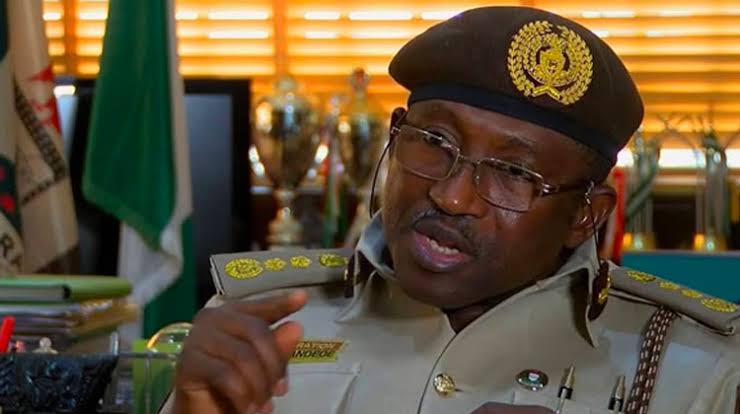A former Comptroller-General of the Nigeria Immigration Service, Muhammad Babandede, on Wednesday called for the adoption of advanced technology and strategic leadership to enhance border security and address transnational threats.
Speaking at the National Peace and Security Course organised by the Institute for Peace and Conflict Resolution in Abuja, Babandede emphasised the critical role of integrating human expertise and cutting-edge technology to manage both physical and virtual borders effectively.
In the paper titled, ‘Border security and transnational threats,’ Babandede argued, “The UK is an island nation, so they invest more at the Airport and Sea Border. We are not in any way different as a nation; in Nigeria, we have the land, air, and sea borders to control.
“We must deploy all Border Security Assets ranging from well-trained, motivated and competent Manpower, Technology that is current and managed by well-trained experts in Information, Communication Technology platform and supervised by Strategic thinking Leadership.”
His comments follow the arrest of at least 10 persons on Interpol’s watch list while entering Nigeria.
The Minister of Interior, Mr Olubunmi Tunji-Ojo, revealed this on Tuesday at the unveiling of the Technology Innovation Complex at the Nigeria Immigration Service headquarters in Abuja.
It comprised a Data Complex comprising the Command and Control Centre (regular migration), NIS Data Centre, ECOWAS Biometric Card Production Centre, Interior Data Centre, and a 0.5KW solar power plant.
Tunji-Ojo told President Bola Tinubu, who commissioned the facility, that the newly installed centre would ascertain the risk level of persons entering the country, detect irregular migration patterns, and monitor unmanned borders in hard-to-reach areas nationwide.
Babandede, who served as the 16th Comptroller General of the Nigeria Immigration Service, spoke on his experience launching the Migrants Information Data Analysis System in 2022.
He described it as one of the best systems ever deployed by the NIS because “it is a real-time clearance system that deploys information and Biodata about the traveller sharing same with the service NIS Database, INTERPOL 24/7 and other relevant security platforms.
Babandede explained, “Government is a continuum. During my time the Technology Building was emplaced to take care of Databases related to all NIS service deliveries.
“As the service progressed, an APIS platform was recently commissioned by the NIS. It deals with Advance Passenger Information Systems that flags off details about a prospective traveller to Nigeria before arrival, alerting the NIS, which will function effectively when connected to the servers and technology within the Technology Building at the NIS headquarters for effective operations of the service activities.”
The former Immigration Chief turn border security expert said organised criminals are interested in a faster and bigger way of carrying out their nefarious activities.
“When I queried Artificial Intelligence on the Sea Border, the discovery was alarming. But we are not far from overcoming our sea-related issues. The boarding of ships is approved in the Immigration Act 2015.
“If very serious and professional boarding and clearance is carried out, no Captain and crew member will circumvent Immigration Security Clearance by aiding Stowaway and smuggling contrabands through the shipment,” he noted.
Babandede said Nigeria must take a cue from failures worldwide, watch its neighbours closely, and gird up its loins against sophisticated threats today.
“We had the first experience after the death of Ghadaffi; now, with Syria falling into the hands of extremist factions, we must watch the exit of Bashar Assad. We must watch our neighbours from Niger, Chad, Cameroon, Benin Republic and Coastal Cape Verde.
“Our border agencies must step up professional engagement and make public safety a priority. Transnational crime is organised; they are well connected. So handling it entails both diplomacy and high-level professionalism to curb.”
He recommended that there is a need to carry out a national threat assessment using data from border security agencies on transnational crimes and threats.
“We must provide defined Leadership, not regime protection but Leadership that is nationally centred. Teamwork is vital. There should be no need for inter-agency rivalry. Tasking and coordination are a must.
“Continuity in governance and leadership of MDAs: someone laid the foundation, and another continues from where the former stopped, as far as the project is not a waste or irrelevant to national growth and development.
“Need for tools and strong institutions to handle border-related problems. SWOT analysis is vital for the success of any system. Duplication and creation of existing or similar agencies are counterproductive; rather, there could be mergers and strengthening of the existing Institutions,” the former CG stated.
He opined that the country must focus on establishing strong institutions that fuel the right narrative through strategic communication, saying “the right word at the right time directed at addressing issues arising” is vital.







